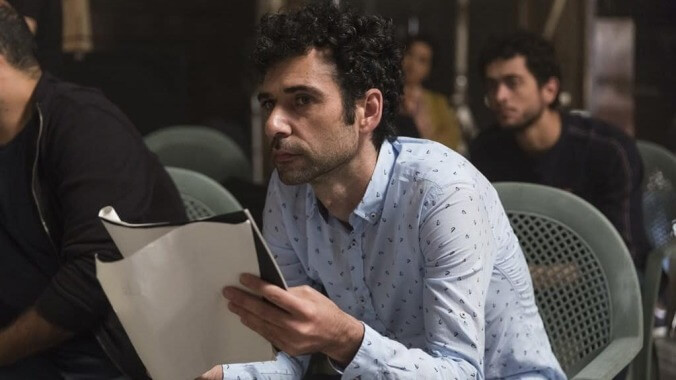You could make a sharp satire about the Israeli-Palestinian conflict, but Tel Aviv On Fire isn’t it

To make a movie about the Israeli-Palestinian conflict is, necessarily, to work with volatile materials. And from its title alone, Tel Aviv On Fire, the new comedy from Palestinian director Sameh Zoabi, suggests something truly incendiary. It’s hardly an accident that the first argument in the film concerns the word “explosive.” The flare-up, though, doesn’t take place on a battlefield of any sort, but on the set of a popular Arab soap opera also titled Tel Aviv On Fire—a romantic spy story set three months before the Six-Day War of 1967. The issue is basically semantic: The word can’t be used as a compliment (“You look explosive tonight,” per the script), so despite the screenwriter’s intended double meaning, the line has to be changed. Refreshingly specific in its humor, the scene is also, unfortunately, about as close as Tel Aviv On Fire gets to providing any actual insight across its runtime.
Granted, there’s some value in the way the film captures the day-to-day realities (and casual indignities) of living in the region. Centered mainly on a Palestinian production assistant named Salam (Kais Nashif)—hired on set solely because his uncle produces the TV show—Tel Aviv On Fire incorporates details like his daily drive through a border checkpoint between Jerusalem (where he lives) and the city of Ramallah (where the show is produced). By now routine, this commute occasions a meeting with Assi (Yaniv Biton), an Israeli border officer whose wife, like many Israelis and Palestinians, is a huge fan of the (fictional) show. And when Salam stumbles into becoming a screenwriter on Tel Aviv On Fire—a problem because he can’t write to save his life—it’s none other than Assi who helps him conceive of scenes involving Yehuda, the show’s Israeli general character. Eventually, the situation becomes irresolvable, with Salam struggling to satisfy the show’s Palestinian producers, who expect the script to forward a clear anti-Zionist agenda, as well as Assi, who wants to turn Yehuda into the soap’s romantic hero and eventually tries to coerce Salam into doing just that under the threat of taking away his ID.
Despite its loaded premise, Tel Aviv On Fire rarely sparks more than mild amusement. As political commentary, it’s a thoroughly anodyne affair. The Oslo Accords come up (described as an “illusion” of peace), and a running joke about hummus eventually leads into Salam’s childhood remembrances following the First Intifada. But these details don’t factor into much more than earnest, even naïve pleas for change; provocative or potentially offensive elements are sanded down, absorbed into Zoabi’s tired satirical take on soap opera conventions. Its charged political context notwithstanding, the film arguably works best as a portrait of a young slacker—the kind of guy who once broke things off with his ex-girlfriend, Mariam (Maïsa Abd Elhadi), by likening himself to “a fish in the Dead Sea” who “needed the Mediterranean.” (Nashif was awarded the Best Actor prize in the “Horizons” section of last year’s Venice Film Festival, and his easy demeanor plays well off the film’s farcical turns.) Ultimately, Tel Aviv On Fire never transcends the schlocky conventions it attempts to satirize. It’s yet another reminder that even the most explosive material can be made to feel utterly harmless.